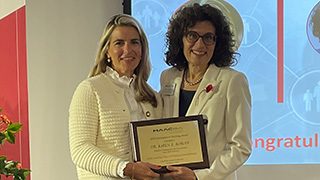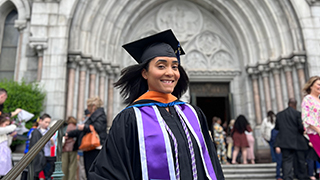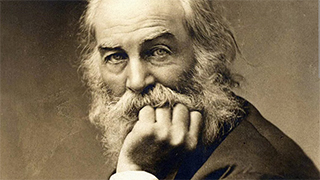Stillman Professor Wins Teaching Innovation Award
Monday, October 30, 2023

Karen Boroff, pictured with Vana M. Zervanos, Ed.D., MBA, who chaired the award selection committee on behalf of MAACBA and who also serves as the associate dean of the Haub School of Business at Saint Joseph's University.
Karen Boroff, Ph.D. has earned the prestigious 2023 Innovation in Teaching Award from the Middle Atlantic Association of Colleges of Business Administration (MAACBA). Aligning with MAACBA's mission to promote and improve collegiate education for business in all areas within its jurisdiction, each year the organization honors one exceptional faculty trailblazer for teaching innovation in business education.
Boroff, management professor and dean emeritus in the Stillman School for Business, was recognized for the "Active Learning Project" that she integrated into her BMGT 2503 – Organizational Behavior course. She is one of only two Seton Hall faculty members to win this competitive annual award.
The Active Learning Project (ALP) is a significant component of the BMGT 2503 – Organizational Behavior course at Seton Hall University's Stillman School of Business. This course is mandatory for all undergraduate students within the business school and covers a wide range of organizational behavior concepts, such as personality, job satisfaction, communication, leadership, and more.
"The Active Learning Project in my Organizational Behavior course serves as a practical and transformative learning experience that goes beyond classroom theory, enabling students to apply their knowledge in real-world settings and develop essential skills for their future careers," said Boroff.
The ALP constitutes 25% of the students' final grade and focuses on either organizational change or organizational culture, encompassing both theoretical understanding and practical application. It also aims to enhance students' collaboration, communication, and critical thinking skills through qualitative field research.
Students are divided into teams of about four individuals from their class and, later, combined with teams from the other section of the same course. Each team is assigned a firm to visit or a trade show to attend. Firms included Weichert Realtors, Taubman Realty Group (the commercial real estate firm that owns The Mall at Short Hills), and Gary’s Wine. The trade shows included the NY Restaurant Show, the NY Fashion Show, the NJ Franchise Show, and the NJ Home and Garden Show. These visits involve questioning hosts about industry changes, responses to those changes, and strategies to overcome resistance to change.
After going to the trade show, one student shared, "I realized I am very capable, and actually excel at, verbal face-to-face communication in a professional environment."
In addition, four students from each class, totaling 8 students, were assigned to visit United States Military Academy (USMA) at West Point to study its organizational culture and how that culture differed from or was similar to Seton Hall’s. They analyzed elements of culture, strengths, weaknesses, and possibilities for adaptation. One student noted, "At West Point, I learned about the value of in-class participation and how I can benefit from engaging in class discussions more. I also learned how to interact with people who are from a completely different culture and how similarities can still arise."
The ALP consisted of several stages, including preparatory meetings, the submission of a core "shell" document, and the creation of a comprehensive report with a video presentation. Students evaluated their teammates, and the project provided ongoing assessment and feedback.
In addition to academic learning, students gain valuable professional skills, such as interacting with different cultures, conducting research, and improving communication. They also develop insights about their personal growth and abilities, including their ability to adapt, excel in professional communication, and engage effectively in group projects. As one student reflected, "Being able to reach out to the heads of organizations taught me etiquette regarding communication. The report creation helped me at my internship."
Boroff's inspiration for the Active Learning Project stemmed from her "The Business of Food" course, where she initiated the concept of extending the classroom beyond traditional boundaries by having students attend industry trade shows and conduct interviews with professionals in the field. This approach yielded valuable insights for the students, as one remarked that they "felt like a real business professional" for the first time, while another sought guidance on proper conduct during business trips. Additionally, students realized the significance of interviewing others, which enhanced their preparedness for job interviews. This concept evolved into the ALP, providing students with valuable experiential learning opportunities in the field of organizational behavior.
In addition to her recognition by MAACBA, Boroff received the Distinguished Alumnus Faculty Award by USMA’s Department of Behavioral Sciences and Leadership in 2022. During her two sabbaticals at USMA, she taught departmental courses in human resource management and leading change, authored award-winning research papers, and mentored faculty and cadets for personal and professional excellence.
Categories: Business






